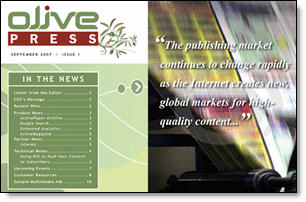More publishers seeing green, especially Olive green


At the same time print folks are finding their content, new and old alike, has real value to users and thus to advertisers if it's available online. So this is how an interview with a publisher and a software company ends up in a blog about green tech. More online text use and revenue means less printing, less paper, fewer delivery trucks, etc. etc.
Recently I had the chance to talk with Olive Software’s Director of Product Marketing, Peter Spielvogel; and The City Paper’s publisher, Albie Del Favero. Spielvogel is at a Silicon Valley software company, funded by Sequoia Capital and privately held. Del Favero is two thousand miles away in Nashville where his paper is published, and read. He calls "The City Paper" a local, local. It's the secondary daily paper in the Nashville market. So they never had that fat classified ad revenue to begin with.
Using Olive's software the Nashville paper is now completely online: text, photos, ads. Click here to see how it works and turn some virtual pages. Dal Favero says they've cut their press run already and may eventually curtail daily printing, maybe going to three printed editions per week. The costs of putting ink onto paper and then flinging that paper around can be staggering. Half of this daily's revenue traditionally went to printing costs. Over 1.5 million tons of newsprint were needed annually. And then you have to haul all that paper around and deliver it. And, of course, many of those papers were never even picked up by a customer. They languished in a rack somewhere and then were recycled.
Of course, the online e-paper has the obvious advantages of all Internet content. It is available to users anywhere. A Nashvillian at a convention in Boston can still catch the local high school sports news online. Once it is fed into the Olive system the archive is created, the content is searchable and even the ads can be seen in their contemporary context years later.
Olive has many customers across the English-writing world. And in a dozen other languages as well.
Here are some examples of their software at work, saving paper and energy:
Guardian newspaper: you can get a free trial for their digital archive dating back to the 18th Century. Yes, that's way before the Internet.
"Rolling Stone" 40 th anniversary issue.
"The Scotsman" digital archive. You can get a free tiral but it's also subscription based as is the "Guardian."
Finally, Olive has become much more than a software vendor. They prvide hosting of archival materials and production work for many of their media clients. They were founded in 2000 so I guess they made it through the burst of that bubble in fine shape.